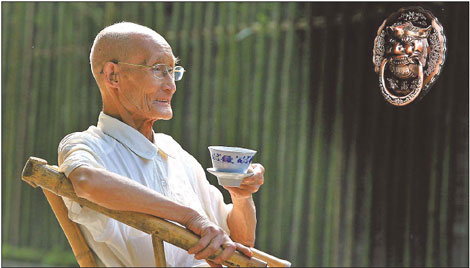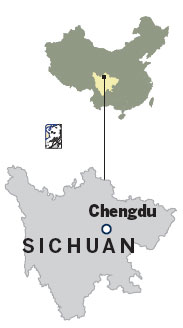Why Sichuan cuisine is 'hot'
Updated: 2012-03-07 16:02
(China Daily)
|
|||||||||||
 |
|
Chengdu is a city famed for its laid-back lifestyle, where people like to spend their days in parks or teahouses. Zhu Jianguo / China Photo Press |
 Sichuan's damp air and overcast skies help explain this mountain-locked province's famed mind-blowing spicy cuisine.
Sichuan's damp air and overcast skies help explain this mountain-locked province's famed mind-blowing spicy cuisine.
In essence this is a love story. That's how Chengdu-native and food writer Shi Guanghua describes Sichuan cuisine, as we know it today. And like all classic romances, the union of Sichuan's native Chinese prickly ash and pepper, imported from South America around the end of the 17th century, via Europe, could be a challenge to anybody trying to sample it, especially the first-time round.
The taste-bud-tingling, gullet-numbing sensation has now become a metaphor for Sichuan cuisine - famed the world over for its sharp and furious kicks on the palate, threatening to set one's mouth on fire.
As for the people of mountain-locked Sichuan, where the air is damp and the skies overcast on most days, this fiery hotness in their food is a sure-shot turn-on, Shi says.
But that's only half the story. For the "hot" in Sichuan cuisine is not just the lethal punch that might send unaccustomed diners gasping and reaching for a jug of iced water. It can also be experienced in its array of subtly-defined, multi-layered, many-splendored varieties.
At a glance:
·Chengdu is the capital of Sichuan province, in southwestern China.
·Located on the western edge of the Sichuan basin, Chengdu has a humid subtropical climate.
·It is on of the most important cultural, economic and transportation hubs in western China. Due to its rich natural resources, Chengdu has been dubbed "Tianfu Zhiguo" (the land of abundance).
·UNESCO awarded Chengdu the title "Capital of Delicacy" in February 2010. Chengdu has 60,000 restaurants. Yulin Xilu and Kuanzhai Xiangzi are its two noted bar streets.
·Quite a few tourist attractions in Chengdu are built around the former residences of writers, Tang Dynasty (AD 618-907) poets Du Fu and Xue Tao, for example.
·A panda-breeding center is located in Chengdu's northern suburbs.
·An annual South China Snow and Ice Festival, from January to March, has been held on Xiling Snow Mountain, Dayi county, since 2001.
·Brocade from Chengdu enjoyed great popularity among the royal families in the Western Han Dynasty (206 BC-AD 24). Chengdu has been called "Brocade City" ever since.